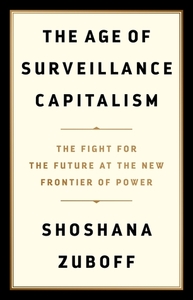Take a photo of a barcode or cover
662 reviews for:
The Age of Surveillance Capitalism: The Fight for a Human Future at the New Frontier of Power
Shoshana Zuboff
662 reviews for:
The Age of Surveillance Capitalism: The Fight for a Human Future at the New Frontier of Power
Shoshana Zuboff
informative
reflective
relaxing
slow-paced
This is a very difficult book to rate, as I didn't "really like" it at all; however, the content is well researched and so important that I feel obliged to give it 4 stars. Dr. Zuboff truly knows how to research and pull relevant political, philosophical, and religious points from the past and weave it well within the overall narrative. The only flaw was that of her editors - this could have been trimmed down some 100-200 pages as there are chapters that repeat very similar content.
It wouldn't surprise me at all if Jonathan Nolan and Lisa Joy both read this book when coming up with the idea/plot of Westworld, because it certainly seems that based off of Zuboff's book that we're heading in that direction.
It wouldn't surprise me at all if Jonathan Nolan and Lisa Joy both read this book when coming up with the idea/plot of Westworld, because it certainly seems that based off of Zuboff's book that we're heading in that direction.
This has to be one of the most important books of our time. In an age where Tech billionaires care nothing about an individual's privacy, in the relentless pursuit of profit.
They are selling our souls and causing misery, but collectively we can stop them. It will cause friction and requires personal sacrifice, but we have to step up and say no more.
It's a very dense book, but the research is meticulous and the message is very clear. We must act and we must act now. I can't recommend this book enough for everyone, but especially those sceptics who think they have nothing to hide. You do, we all do and we need to protect it.
They are selling our souls and causing misery, but collectively we can stop them. It will cause friction and requires personal sacrifice, but we have to step up and say no more.
It's a very dense book, but the research is meticulous and the message is very clear. We must act and we must act now. I can't recommend this book enough for everyone, but especially those sceptics who think they have nothing to hide. You do, we all do and we need to protect it.
informative
reflective
slow-paced
How this book ended up on my TBR: Great question. In January I was suddenly very interested in books involving technology and human effects (which included Jonathan Haidt's The Anxious Generation, a book I listened to for about half an hour before returning to the library because I already knew I'd dislike the book; I will attempt Chris Hayes's The Sirens' Call). I have some general interest in the topic, but even I was taken aback by the lengthy nature of this book (24-hour-audiobook). That said, I gave the introduction a shot and decided to power through, and I'm generally glad I did.
This is one of those times where I don't feel smart enough to accurately review the book. There are some lengthy reviews from people who, no doubt, paid better attention than I did. What did pique my interest was the use of specific examples scattered a bit randomly through the book. Upon reading another review, I did find the lack of studies to be a little jarring. This is not to say that the book isn't well-researched; I was heartened to hear of the author interviewing several data scientists and those connected with media companies. But the very deep dive into topics like behaviorism were a little much for a casual reader.
I do think that Zuboff does a very good job raising the alarm and explaining the lengthy road and history that has enabled companies like Google and Facebook to collect and sell data. A good deal of that road is political as well, but as the name suggests, the motivating factor we're looking at is money (and power). Money for companies like Google, Facebook, Microsoft, and Apple that are offering "free" products to the public (not even consumers, in most cases) so that they can profit by selling our data to other companies. This is not news to those of us who have paid partial attention to the tradeoff of the convenience of our devices and applications. And there are those who would say "whatever, take my data, I don't mind not having privacy", you may change your tune one the buyer of that data has the desire and ability to make your life a living hell. The example of China is particularly chilling, and it's frankly terrifying to think how my government can use my data against me.
Zuboff doesn't suggest any one or range of solutions, per se. She's not advocating for everyone to turn off their smart devices and live off the grid, but I think she starts by encourage us to be more mindful of our habits. I feel like, if someone is reading the entirety of this book, she's preaching to the choir a little bit. But I also think the solutions are manyfold and complicated. Organizations should not be able to police themselves, and governments should not shirk their responsibilities to their citizens. I think of late a lot of folks have been thinking about their habits, which social media sites they use (good luck getting away from Google or Facebook and still knowing what's happening in the world). I know I flipped out at the idea of Clue, the women's health and menstrual cycle app, having to provide information to my government (and Clue was very clear that they would not provide said information). I am almost entirely reliant on Google Docs for my work; now I'm trying Joplin, an application that isn't free (if you want to access your account on multiple devices) but that is also very secure.
So "enjoy" is not really a word I associate with this book, and while acknowledging that I zoned out a goodly amount while listening to this book, I found it a worthwhile read, and I did learn a ton. Nicol Zanzarella narrates this book and does a phenomenal job.
This is one of those times where I don't feel smart enough to accurately review the book. There are some lengthy reviews from people who, no doubt, paid better attention than I did. What did pique my interest was the use of specific examples scattered a bit randomly through the book. Upon reading another review, I did find the lack of studies to be a little jarring. This is not to say that the book isn't well-researched; I was heartened to hear of the author interviewing several data scientists and those connected with media companies. But the very deep dive into topics like behaviorism were a little much for a casual reader.
I do think that Zuboff does a very good job raising the alarm and explaining the lengthy road and history that has enabled companies like Google and Facebook to collect and sell data. A good deal of that road is political as well, but as the name suggests, the motivating factor we're looking at is money (and power). Money for companies like Google, Facebook, Microsoft, and Apple that are offering "free" products to the public (not even consumers, in most cases) so that they can profit by selling our data to other companies. This is not news to those of us who have paid partial attention to the tradeoff of the convenience of our devices and applications. And there are those who would say "whatever, take my data, I don't mind not having privacy", you may change your tune one the buyer of that data has the desire and ability to make your life a living hell. The example of China is particularly chilling, and it's frankly terrifying to think how my government can use my data against me.
Zuboff doesn't suggest any one or range of solutions, per se. She's not advocating for everyone to turn off their smart devices and live off the grid, but I think she starts by encourage us to be more mindful of our habits. I feel like, if someone is reading the entirety of this book, she's preaching to the choir a little bit. But I also think the solutions are manyfold and complicated. Organizations should not be able to police themselves, and governments should not shirk their responsibilities to their citizens. I think of late a lot of folks have been thinking about their habits, which social media sites they use (good luck getting away from Google or Facebook and still knowing what's happening in the world). I know I flipped out at the idea of Clue, the women's health and menstrual cycle app, having to provide information to my government (and Clue was very clear that they would not provide said information). I am almost entirely reliant on Google Docs for my work; now I'm trying Joplin, an application that isn't free (if you want to access your account on multiple devices) but that is also very secure.
So "enjoy" is not really a word I associate with this book, and while acknowledging that I zoned out a goodly amount while listening to this book, I found it a worthwhile read, and I did learn a ton. Nicol Zanzarella narrates this book and does a phenomenal job.
It truly is very wordy and was difficult to read due to the writing style. I was introduced to it by Philosophy Tube, and really was inspired to check out the ebook on Sora. I'm kind of disappointed. I may pick it up again later, but we will have to see when I have the time and energy.
challenging
dark
informative
slow-paced
This is a fascinating if incredibly dense work that is terrifying and depressing throughout. Zuboff is at times slightly repetitive which is both a blessing and a curse as there’s an awful lot of jargon and information to absorb. As tough as it was to get through at times, I’d go as far as to say it’s essential reading and a rallying cry for the digital age.
informative
slow-paced
challenging
informative
slow-paced
challenging
informative
reflective
slow-paced
informative
medium-paced






